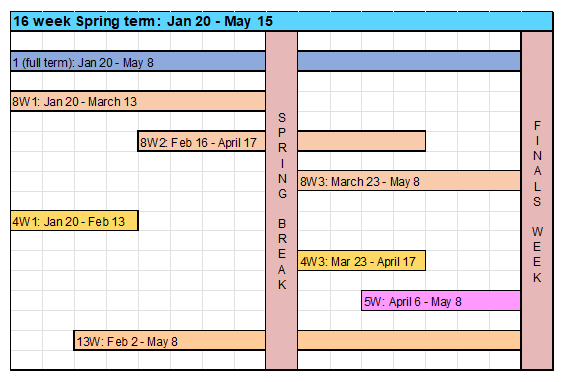Spring 2026 Schedule of Classes Submission
The due date for submitting your class schedule for the Spring 2026 Schedule of Classes is May 16th, 2025.
Please pay special attention to the following areas:

All classes must fit within a session, which means they must begin during the first week of the session, and end during the last week of the session. In other words, if a class is held during the 8W2 session, it needs to start during the week of February 16th and end during the week of April 17th.
Meeting Patterns will be strictly enforced. All components (lecture/lab/discussion/etc.) will need to fit one of the patterns of the Standard Meeting Pattern Grid (included in Excel template). If a class section is made up of more than one component type, more than one pattern may need to be used. In order to avoid course bottlenecks and conflicts for students, classes should be spread out over the course of the week from Monday through Friday and throughout the day from 8am to 5pm, using a balance of 2- and 3-day meeting patterns.
Slash Courses. For departments that do not have an active graduate program, we will no longer be scheduling the grad portion of undergrad/grad “slash" (300/500, 400/600) for every offering. These will be added as-needed for graduate student enrollment. Any combined classes must be equivalent or cross-listed in the catalog.
Graduate-Level Instructors must be members of the graduate faculty or authorized by the Graduate Council to teach graduate-level classes.
Special Course Fees must be approved by the Controller. There is an eform to collect the course fee requests (https://eforms.uwsp.edu/workspace.aspx). Please mark the Special Course Fee Requested column on the submission spreadsheet if you have requested a fee for this course or class section via this eform, so I can coordinate with Student Financials Services. Special course fees are no longer listed in class notes.
Online/Hybrid Classes replace all or some of their required classroom credit-hour time with online work. If the section is delivered completely online, with no campus visit required, then the course should be reported as 100% online. If only a portion of classroom credit-hour time is replaced with online work, report the percent of time that has been replaced with online work.
Point-to-Point (Synchronous Distance Education): We have added Instruction Modes for these types of classes to help clarify for students, as well as aid in the planning of Distance Education room schedules. Point-to-Point refers to classes that take place in more than one facility where instruction is digitally transferred from one campus to one or more remote sites in real time. This could take place between Stevens Point, Wausau, and/or Marshfield campuses, or another academic institution with a Distance Education classroom. Hybrid Point-to-Point refers to the same, but some of the in-class meeting time has been replaced with Online work.
- NOTE: When requesting these modes, please include “This class is hosted at (campus) and delivered via Distance Education to (campus/campuses)" in the Class Notes field so it can be added to the timetable.
| Online Instruction | Report as | Instruction Mode as viewed in Class Search by students | Code | | |
| 100% Online | 100% | Online | O | | |
| 100% Online | 100% | Synchronous Online | S | | |
| 75-99% | 75% | Hybrid | H | | |
| 50-74% | 50% | Hybrid | H | | |
| 30-49% | 30% | Hybrid | H | | |
| <30% | <30% | In Person | P | | |
| n/a | In Person | In Person | P | | |
| FLD/IND/RSCH | In Person | Individualized | I | | |
| n/a | In Person | Point-to-Point | PP | | |
| 30-99% | 30%, 50% or 75% | Hybrid Point-to-Point | HP | | |
| Note: Point-to-Point and Hybrid Point-to-Point refer to classes that take place in more than one facility where instruction is digitally transferred from one campus to another or others. This could take place between Stevens Point, Wausau, and/or Marshfield campuses, or any of these and another academic institution. | | | | | |
| | | | | | |
| | | | | | |
| | | | | | |
Note on Out-of-State Learning Placements
In years past, Todd Huspeni has reached out once a year to collect which (if any) courses have resulted in any out-of-state placements during the previous year for internships, student teaching, clinical rotations, and the like. To try to make this data collection a little easier, we'd like to try to collect which possible courses this will occur in as you schedule them so we've added a new column (“Could this result in an OOSLP?") to the spreadsheet. If you think there is a chance that a course you are scheduling will result in an out of state placement, please indicate OOSLP in column L and we will follow up for details later. If you have any questions on definitions or criteria for this category, let me know.
If you have any questions regarding class scheduling, please contact Andrew Ludwig in the Registrar's Office (regsoc@uwsp.edu).
